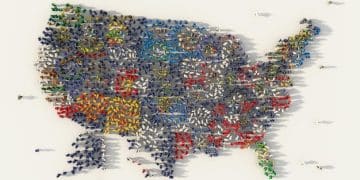US tech innovation: AI’s future impact analyzed

Examining US technological innovation, artificial intelligence stands to profoundly redefine industries, societal structures, and daily life, marking a transformative era in human advancement while posing significant ethical and practical challenges for the future.
The landscape of United States technological innovation is continuously evolving, with certain advancements promising to fundamentally alter our societies. Among these, artificial intelligence (AI) stands out as a seismic force, poised to reshape industries, economies, and the very fabric of daily life. Understanding how US Technological Innovation: How Will Artificial Intelligence Shape the Future? is not just an academic exercise; it’s a critical inquiry into the trajectory of human progress and the challenges that accompany it.
AI as a Catalyst for Economic Transformation
Artificial intelligence is not merely an incremental improvement; it represents a fundamental shift in how we approach problems, create value, and organize work. In the US, AI’s potential to drive economic transformation is immense, touching every sector from manufacturing to services.
The integration of AI into existing business models promises increased efficiency and productivity. Automated systems, predictive analytics, and machine learning algorithms are enhancing decision-making processes, optimizing supply chains, and streamlining operations across various industries.
Redefining Industries and Job Markets
The impact of AI on industries is multifaceted, leading to both disruption and new opportunities. Traditional sectors are embracing AI to stay competitive, while entirely new industries are emerging.
- Manufacturing: AI-driven robotics and automation are leading to smarter factories, predictive maintenance, and highly customized production lines.
- Healthcare: AI assists in diagnostics, drug discovery, personalized treatment plans, and operational efficiency within hospitals.
- Finance: Algorithmic trading, fraud detection, and personalized banking services are becoming standard thanks to AI.
While some fear job displacement due to automation, the consensus among experts is that AI will also create new roles and necessitate a workforce with different skill sets. The focus shifts from repetitive tasks to roles requiring creativity, critical thinking, and complex problem-solving abilities, often in conjunction with AI systems.
The US economy, with its dynamic labor market, is expected to adapt by reskilling and upskilling its workforce, fostering a human-AI collaborative environment. This transition will require significant investment in education and training programs to prepare individuals for the jobs of tomorrow.
Ethical and Societal Implications of AI in the US
Beyond economic shifts, the pervasive adoption of AI in the US brings forth profound ethical and societal questions. The concerns range from privacy and data security to algorithmic bias and accountability, demanding careful consideration from policymakers, developers, and the public.
Issues of algorithmic bias are particularly critical. If AI systems are trained on biased data, they can perpetuate and even amplify existing societal inequalities in areas such as hiring, lending, and criminal justice. Ensuring fairness and equity in AI development is paramount to its responsible deployment.
Addressing Privacy, Security, and Bias
Protecting user data and ensuring the security of AI systems against malicious attacks are constant challenges. As AI integrates deeper into critical infrastructure, robust cybersecurity measures become non-negotiable. Additionally, transparent governance frameworks are essential to build public trust.
- Data Privacy: AI systems often rely on vast datasets, raising concerns about individual privacy and the potential for misuse of personal information.
- Algorithmic Accountability: Establishing clear lines of responsibility when AI systems make critical decisions is crucial, especially in autonomous applications.
- Bias Detection and Mitigation: Developing techniques to identify and correct biases in AI models is vital to prevent discrimination and promote equitable outcomes.
The ethical implications extend to the potential for AI to influence human behavior, spread disinformation, or create autonomous weapons. These considerations necessitate ongoing dialogue, careful regulation, and a commitment to developing AI that aligns with humanitarian values. The US, as a leader in AI innovation, has a responsibility to set global standards for ethical AI development and deployment.

AI’s Role in Advancing Scientific Discovery and Research
Artificial intelligence is rapidly becoming an indispensable tool for accelerating scientific discovery and research across disciplines. Its capacity to process, analyze, and synthesize enormous datasets far surpasses human capabilities, opening new frontiers in fields from medicine to astrophysics.
In biomedical research, AI algorithms are revolutionizing drug discovery by identifying potential compounds and predicting their efficacy at an unprecedented speed. It also aids in understanding complex biological systems, accelerating breakthroughs in disease diagnosis and treatment. For example, AI can analyze genomic data to identify predispositions to certain conditions, leading to more personalized preventive care.
Revolutionizing R&D in Key Sectors
The integration of AI in research and development (R&D) is transforming how scientific questions are posed and answered. AI-powered simulations and virtual labs allow for rapid prototyping and testing, significantly reducing the time and cost associated with traditional experimental methods.
- Materials Science: AI helps discover new materials with desired properties, accelerating innovation in electronics, energy, and construction.
- Climate Science: AI models analyze climate patterns, predict environmental changes, and optimize strategies for sustainability and disaster preparedness.
- Space Exploration: AI assists in processing astronomical data, controlling autonomous rovers, and planning complex missions to distant celestial bodies.
Furthermore, AI facilitates interdisciplinary research by identifying connections and patterns across disparate datasets that might escape human observation. This collaborative potential of AI promises to break down traditional silos in academia and foster a more integrated approach to complex scientific challenges. The US research ecosystem is uniquely positioned to leverage these AI capabilities, driving global leadership in discovery and fostering a new age of scientific exploration.
The Geopolitical Landscape and AI Supremacy
The race for AI supremacy has become a central feature of 21st-century geopolitics. Nations recognize that leadership in AI development translates directly to economic power, military advantage, and international influence. The US is a key player in this global competition, constantly navigating the complex interplay of innovation, security, and ethics.
Investment in AI research, the cultivation of top talent, and the development of robust regulatory frameworks are all critical components of a nation’s AI strategy. The US’s historical strength in technological innovation provides a significant advantage, but other nations are rapidly catching up, making the competition fierce.
Balancing National Security and Open Innovation
A central challenge for the US is balancing national security concerns, particularly regarding sensitive AI technologies, with the benefits of open innovation and international collaboration. Export controls, restrictions on technology transfer, and concerns about foreign influence on US research are subjects of ongoing debate.
- Military Applications: AI is transforming defense capabilities, from autonomous systems to advanced intelligence analysis, raising questions about ethical use in warfare.
- Cybersecurity Threats: Nations leverage AI for both offensive and defensive cybersecurity operations, creating an ongoing arms race in the digital realm.
- Global Standards: The US aims to shape international norms and standards for AI governance, promoting democratic values and responsible innovation.
The geopolitical implications extend to trade relationships, intellectual property disputes, and the potential for a new form of digital colonialism, where nations with advanced AI capabilities exert disproportionate influence. Maintaining a strategic edge while fostering a collaborative global environment for AI development will be a defining challenge for US foreign policy in the coming decades.
AI’s Impact on Daily Life and Human-Computer Interaction
Beyond boardrooms and research labs, artificial intelligence is increasingly interwoven into the fabric of daily life, transforming how individuals interact with technology and the world around them. From personalized recommendations to intelligent assistants, AI is making technology more intuitive, responsive, and seamlessly integrated into our routines.
Smart home devices, powered by AI, learn user preferences and automate tasks, optimizing energy consumption or creating personalized environments. Navigation apps use AI to predict traffic and suggest optimal routes, saving time and reducing stress. These are just a few examples of how AI is simplifying and enhancing everyday experiences.
Transforming Personal and Public Services
AI is also revolutionizing personal and public services, making them more accessible, efficient, and tailored to individual needs. This includes a wide range of applications from customer support to public transportation.
- Personalized Learning: AI-powered educational platforms adapt to individual learning styles and paces, offering customized content and feedback.
- Assisted Living: AI companions and monitoring systems provide support for the elderly and individuals with disabilities, promoting independence and safety.
- Smart Cities: AI optimizes urban planning, waste management, and public safety systems, creating more livable and sustainable environments.
As AI systems become more sophisticated, they will increasingly anticipate needs and offer proactive solutions, moving beyond mere reactive responses. The challenge will be to ensure these advancements respect privacy, maintain human agency, and are equitably accessible to all segments of society, enhancing rather than diminishing the human experience.
Future Trajectories: Navigating the AI Horizon
As the United States continues its trajectory of technological innovation, the future of artificial intelligence unfurls as a landscape of unprecedented possibilities and challenges. Predicting the precise contours of AI’s ultimate impact is inherently difficult, but certain general directions and critical considerations emerge as paramount.
One likely trajectory involves the increasing specialization and integration of AI. Rather than a singular “general AI,” we will likely see highly specialized AI systems embedded within specific domains, from advanced medical diagnostics to sophisticated climate modeling. These systems will work in concert, forming complex intelligent ecosystems that address multifaceted problems.
Preparing for Advanced AI and Regulatory Frameworks
The development of increasingly sophisticated AI models, including those exhibiting emergent behaviors or greater levels of autonomy, will necessitate ongoing ethical and philosophical debate. Questions about consciousness, sentience, and the definition of intelligence will move from the realm of science fiction to practical engineering and governance.
- Responsible Development: A continued focus on AI safety, robustness, and interpretability will be crucial as systems become more complex and autonomous.
- Adaptive Regulation: Policymakers will need to develop agile regulatory frameworks that can keep pace with rapid technological advancements without stifling innovation.
- Global Cooperation: Addressing the global challenges and opportunities presented by AI will require unprecedented international collaboration on standards, ethics, and research.
In the long term, AI could fundamentally redefine what it means to be human, augmenting our cognitive abilities, extending our lifespans, and enabling new forms of creativity and expression. However, realizing this potential will depend on a collective commitment to responsible innovation, ensuring that AI serves humanity’s best interests while avoiding unforeseen pitfalls. The US has a pivotal role to play in shaping this future, guiding the development of AI towards a path that is both transformative and beneficial for all.
| Key Area | Brief Impact Description |
|---|---|
| 📊 Economic Growth | AI drives productivity across manufacturing, healthcare, and finance, leading to new job types. |
| ⚖️ Ethical Concerns | Addresses privacy, data security, and algorithmic bias, requiring robust oversight. |
| 🔬 Scientific Advancement | Accelerates research in medicine, materials science, and climate studies through powerful data analysis. |
| 🌍 Geopolitical Influence | AI leadership shapes global power dynamics, impacting national security and economic standing. |
Frequently Asked Questions about AI’s Future
AI is expected to transform employment by automating routine tasks, leading to the displacement of some jobs. However, it will also create new roles, particularly in areas requiring human-AI collaboration, creativity, and complex problem-solving. This shift necessitates significant investment in workforce retraining and upskilling programs.
Key ethical challenges include ensuring data privacy, preventing algorithmic bias that could perpetuate discrimination, establishing accountability for AI decisions, and managing the potential for AI misuse, particularly in autonomous systems. Addressing these requires robust regulatory frameworks and continuous ethical scrutiny.
Yes, AI significantly accelerates scientific discovery by processing and analyzing vast datasets far beyond human capacity. It aids in identifying patterns, simulating complex systems, and designing experiments, leading to faster breakthroughs in fields like medicine, materials science, and climate research.
AI leadership is crucial for geopolitical influence, impacting national security, economic competitiveness, and global standards. The US aims to maintain its innovative edge while navigating challenges like export controls and international collaboration to shape responsible AI development worldwide.
AI will increasingly integrate into daily life, making technology more intuitive and personalized. It will enhance convenience through smart devices, improve services like education and healthcare, and transform urban environments, aiming to create more efficient and responsive systems while respecting user privacy.

Conclusion
The profound impact of artificial intelligence on US technological innovation is undeniable, positioning it as a pivotal force that will redefine nearly every facet of future society. From catalyzing unprecedented economic transformation and accelerating scientific discovery to raising critical ethical dilemmas and shaping geopolitical power, AI embodies both immense promise and significant challenges. Navigating this complex landscape will require continuous adaptation, ethical vigilance, and strategic investment to ensure that AI truly serves as a force for positive change, advancing human potential responsibly.





